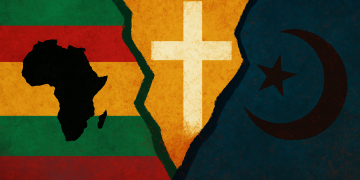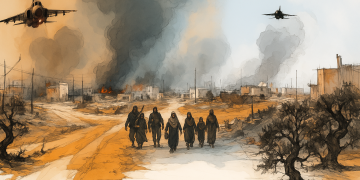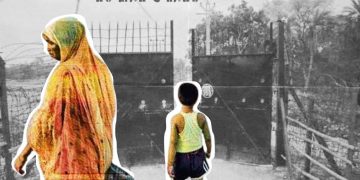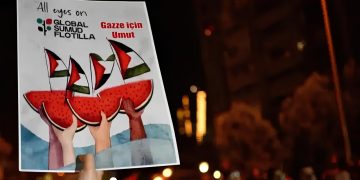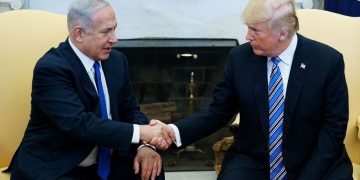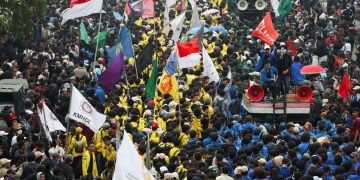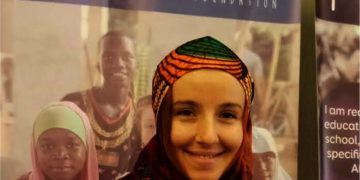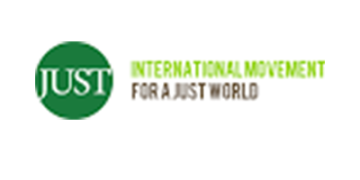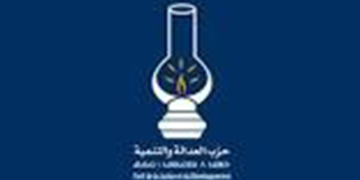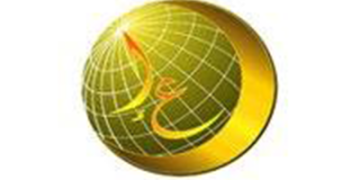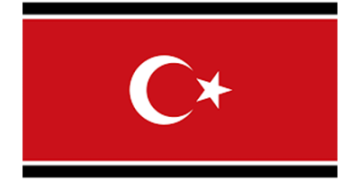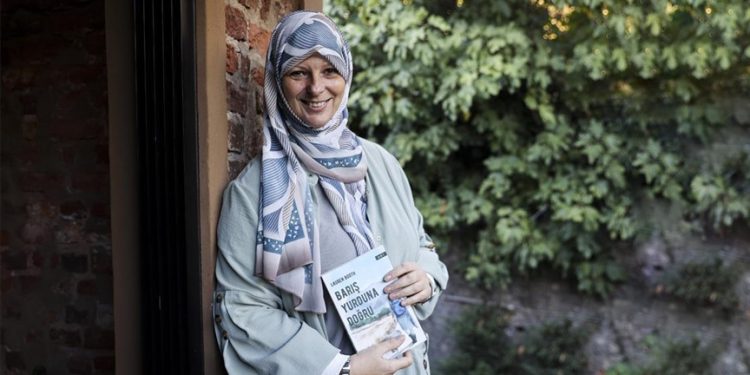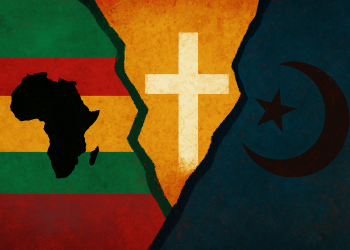Having converted to Islam in 2010, you are an inspiration for many as a writer, journalist, activist and a revert woman who wears a headscarf. How do you evaluate your 13 years of experience as a Muslim woman? Can you share some of the challenges and opportunities you have experienced?
The starting point is never to see an obligation in our religion as a hurdle to real success. Real success is measured by The Creator’s pleasure with our actions and the continued awareness that this life is not the final destination but a dangerous, potentially rewarding, route stop, to eternal bliss (inshallah!) What this mindset allowed me (in light of losing position in the mainstream due to accepting Islam) the ability to welcome challenges as a chance to seek greater good through my words, creating work that matters rather than as a means to pay the bills or become ‘well known’. The periods of financial hardship and front-page mockery which followed my acceptance of Islam, built in me, by Allah’s grace a resilience and determination to stand up for truths which matter and never, ever, negotiate faith requirements for short term gains. Alhamdulilah, shukr Allah.
Being a journalist, you must have closely observed the image of Muslim women as it is portrayed by the Western media. Are you of the opinion that Muslim women in the Islamic world are being oppressed and harassed? If so, is the root cause of this oppression Islam or other traditions? What are your thoughts?
The ideas of femaleness absorbed and increasingly rejected by young Muslim women do not have their roots in the Quran and ‘Islam’ – they come from a toxic modernity which has polluted our cultures. During colonialist rule, Western governments and missionary schools introduced their own beliefs about femininity to Muslim lands. British forces pushed across North Africa, the Middle East and India, which included todays Bangladesh and Pakistan. Their concept of the Victorian delicate and fainting woman clashed with the examples of bravery in battle of Safiyya bint Abdul Muttalib عــــنھا الله رضــــي . Yet they began to permeate local cultures where Muslim history books were banned from education, madrasahs were closed, and an English curriculum and orthodoxy imposed in every area of life. This, over time was blended with a well-funded doctrine which has tried to create “an idea woman.” One with limited parameters in the public and political realms. In short, a version of the Victorian age where children were to be ‘seen not heard.’ Where Muslim women became ‘not seen and not heard.’ Meanwhile, the sexualization of women, and especially Muslim women, also became part of our own, slanted views on the feminine ethos. The harem became an orientalist trope while, in reality, it remained the place where women gathered to do laundry and cook without the need for hijab in a space where men were not allowed. As I have learnt whilst living in Istanbul, the mothers of the Sultans ‘Valide’ and many wives and daughters are behind some of the most pivotal architecture we take for granted across the Ottoman Empire. Their personal fortunes fed and watered those on Hajj and rebuilt and helped sustain Masjid Al Aqsa.
In the 1950s, the veil played an important role during the Algerian war of independence against the French colonial rule. In the 1950s, the veil played an important role during the Algerian war of independence against the French colonial rule. Frantz Fanon, a Martinique-born psychiatrist and anticolonial intellectual, described the French colonial doctrine in Algeria as follows: If we want to destroy the structure of Algerian society, its capacity for resistance, we must first of all conquer the women; we must go and find them behind the veil where they hide themselves and, in the houses, where the men keep them out of sight.’ Fanon was a member of the Algerian National Liberation Front who considered women’s ill-treatment by the French army to embody the whole country’s situation. For him, it was impossible for the colonial power to conquer Algeria without winning over its women to European “norms”. Women were made to feel ashamed of covering and like today, contemplated on whether our very difference in the public realm made us backward and unworthy compared to the less dressed ‘free’ western women. In 1958, during the Algerian war of independence, mass “unveiling” ceremonies were staged across Algeria. But historians would later find that some of the women who participated in these ceremonies never even wore the veil before. Others were pressured by the army to participate. Following the ‘staged unveilings’, many Algerian women began wearing the veil. They wanted to make clear that they would define the terms of their emancipation – rather than being forcefully liberated by the French colonizers. This generation of Muslim women are still in the fight to define the terms of our emancipation according to Islamic parameters which take from neither broken western models nor eastern norms which are a corrupted version of Prophetic care and nurturing.
We witness that women’s participation in socio-political life has been increasing in Muslim societies in general. How do you evaluate it and what can be done to promote women activism in socio-political and economic life?
The questions hint that women either did not have this aspiration or did not participate in previous generations, which is not the case. The question really is why since the time of the early Muslim communities have female believers been gradually removed from importance in certain regions of the ummah? When we couch questions like this, we must be aware that doing so can create in us, as women, a reactionary impulse whereby Western social mores tell us we must be more aggressive at ‘getting our space’. In fact, our faith role models teach us that women can be both gentle and present, strong and modest, polite and determined. What is needed then, is the opening for more spaces, where our voices can be heard, and our ideas enacted. Personally, since, by the grace of Allah, having a man to care for me financially, I want to honour the work of women at home who daily change the community via social projects, charity and frankly – backbone. There is more than one way to change society. Having lived the power suit life, I do not see it as the prototype for female activism. Find your space sisters! Let us follow this call from the Holy Quran: “The believing men and believing women are allies of one another. They enjoin what is right and forbid what is wrong and establish prayer and give zakāh and obey Allāh and His Messenger. Those – Allāh will have mercy upon them. Indeed, Allāh is Exalted in Might and Wise. (Holy Quran 9:71)
The rights of Muslim women and their participation in social life can be associated with feminism by some groups, so much so that there is a so-called phenomenon called Islamic feminism. Where do you think Muslim women should stand in this conceptual confusion? Do Muslim women have to choose one of the two options; patriarchy and feminism?
I often get asked by brothers and sisters ‘So what do you do these days?’ To which my husband and I roll our eyes. Inherent in the question is the unfortunate materialism of the current moment. ‘Islamic feminism’ doesn’t answer the Islamic side of the question; ‘Who are you? And what are your values?’ It merely demands a westernized version of our reality as in ‘what is your net worth’ whilst subliminally adding ‘whatever you are doing won’t be enough by the way…’ The ultimate father and mother archetypes are Adam and Eve. We are united, both as believers (the ummah of Islam) and as brothers and sisters of this global family – the ummah of humanity. By drinking from the poisoned cup of gender ideology we put the greatest of all creation, Prophet Muhammad SAWS, into the ‘wrong’ camp – i.e. manhood. He is, factually, a man, leading the story of Islam. Do we really need to then ask like rather petulant children ‘where is the female leader?’ Come on!
Sachiko Murata, in The Tao of Islam: A Sourcebook on Gender Relationships in Islamic Thought, points out that despite the all-too real misogyny that exists in various parts of the Muslim world, in ‘Islamic cosmology neither the masculine nor the feminine – neither the father nor the mother – are sublimated. Both play essential and complimentary roles.’ Feminism is a fighting posture. Muslim womanhood is an open-handed palm raised upwards calling for energy and vigour from a Creator who is beyond gender and who honors us blessed beings with essential differences vital to societies success.








